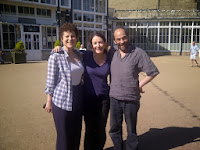That was because the holder of ENO's Mackerras Conducting Fellowship was on the podium for a performance for the first time: Gergely Madaras, 28, from Budapest. He has been working at ENO alongside Ed Gardner, being mentored and nurtured. Perhaps The Magic Flute isn't an ideal debut opera - but his conducting was full of vim and whoosh, extremely alive, well-balanced and tender-hearted. It took a little while to "settle" - there were one or two little disagreements over tempo between pit and stage, and a few moments needed a tad more time to breathe. But that will go, in due course, and on the whole Madaras seems a careful accompanist and a fine, full-spirited musician. I look forward to hearing more of him.
It has been described as the most demanding production ENO has yet staged. Sometimes its effects are stunning: the writhing snake that attacks Tamino is filmed and projected around him; and during the trials the prince and princess swim through a mid-air, hand-drawn spiral, as if starring in Titanic (above). The Temple of Reason emerges from a shelf of giant books; their pages become Papageno's fluttering birds, wielded by 14 actors (below). The Queen of the Night - confined for much of the show to a wheelchair - sings amid a breathing, trembling aura of stars. Moreover, much action takes place on a platform that swings, dips and tips, leaving the singers to balance, pace, slide when necessary and, of course, sing some jolly demanding music throughout - which they managed without the merest flinch.
McBurney was new to opera when he directed the massively successful A Dog's Heart for ENO a few years ago; this is his first classic. A fascinating interview in The Guardian makes the following suggestion: "I want...to take the audience from darkness to light, to make us evolve, to end mystification and embrace reason and rationality. That, as I understand it, is what the opera is about."
The opera has been divested of its racism and as much of its sexism as possible, and - dare I say - is the better for it. The world that the characters move in is profoundly dangerous, riven by war, delusion, superstition; the plea is for wisdom, love, enlightenment. Everything feels here and now; the crisis of humanity of which Sarastro speaks is our own; everything seems real, the more apparently illogical the truer to life - and, moreover, true to the timeless heart of Mozart's vision.
[Dear Simon, please will you do Parsifal next, then the Ring cycle? Lots of love, Jess x.]
In this process of "becoming"; everyone evolves, not only Tamino in his quest for initiation or Pamina in her growth from projected image - literally shining onto Tamino's heart while he sings his great aria - to mature and devoted woman. The magic instruments are played by members of the orchestra, the flautist walking on stage to stand alongside Tamino, the magic bells rendered on a keyboard from a corner of the pit where Papageno can interact suitably (the orchestra is raised so that it is just a notch below the stage).
But Papageno gradually learns to play them himself. Unpacking his parcel of food and wine, he creates a row of bottles which he empties - and in one case, er, fills - to reach the right pitch, and uses them to accompany the start of 'Ein mädchen oder weibchen'. "My old friend Chateauneuf du Pape..." he quips, then wonders if his "friend"'s family is present. Sure enough, inside the basket he finds more bottles. "Ahh, here's Auntie Angela and Uncle Roberto. Better keep those two apart!" - with which he places them at either end of the row. (Apologies to my neighbours in the theatre - I may have squawked...) Anyhow, by the time we get to 'Klinge, glöckchen, klinge', Papageno can tickle the ivories perfectly well and the keyboard player, striding on stage to be his sidekick, is put out to find her services aren't required.
Major plaudits to a terrific cast. Ben Johnson is a superb Tamino - his voice better suited to this role than it was to Alfredo in La Traviata - open-toned, focused and deeply musical. Devon Guthrie's feisty, heart-breaking Pamina matched him turn for turn. Roland Wood's Papageno - from Blackburn? - was a delight. McBurney has him carting a ladder around and from time to time he climbs it to escape something that alarms him, as if fleeing from a mouse. The introduction of a cuckoo noise into his first aria is naughty and rather delicious. James Creswell is an ideal Sarastro and Cornelia Götz a mostly strong Queen of the Night - and I love it that she is redeemed at the conclusion. Pamina doesn't often get her mother back.
Just one other perennial bugbear. The orchestra plays in that contemporary, standardised, "listen!-we-play-18th-century-music-without-vibrato" sound that always has been at odds with that of the human voice, and will always remain so.
In 100 years' time, assuming anyone still remembers who Mozart was, some scholar, assuming scholars still exist, may undertake a research project, assuming research still exists, about The Magic Flute. Of course they will be shocked to see the long hushed-up original text. But where the music is concerned, they might try a daring experiment: have the strings play with vibrato, just once, just to see what happens. And they will be astonished by how beautiful it sounds. And they will look at our generations' reasons for stopping the vibrato. And they will laugh.


